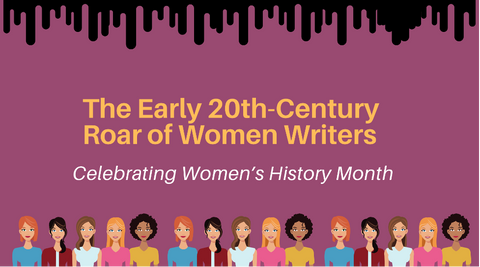The Early Twentieth-Century Roar of Women Writers
In the early twentieth century, a seismic shift in the literary landscape began to unfold as women writers stepped into the limelight, crafting narratives that resonated with both the complexities and the dynamism of the era. Amidst a backdrop of rapid social, political, and technological changes, these pioneering figures broke through the barriers of a traditionally male-dominated domain. They introduced fresh perspectives, innovative narrative styles, and profound thematic explorations. As we celebrate Women's History Month, Dover illuminates the significant contributions of some of these trailblazing women, whose voices, once marginalized or silenced, roared onto the scene with undeniable force and originality, radically transforming the canon of Western literature.
Anita Loos
Anita Loos, best known for her witty and satirical novel Gentlemen Prefer Blondes, was the first female staff screenwriter in Hollywood, writing over 150 scripts and elevating subtitles and intertitles during the silent movie era. Her work epitomized the flapper era's spirit, capturing the zeitgeist of the 1920s with sharp humor and a keen eye for social critique. Loos utilized a narrative style that effectively combined humor with incisive observations on gender roles and societal expectations, challenging the traditional stereotypes of women through her unforgettable protagonist, Lorelei Lee.
Dorothy Parker
Once known as “the wittiest woman in America,” Dorothy Parker was unmistakably a trailblazer in her own right. She was a founding member of the Screen Writers Guild and the Algonquin Round Table, composed of New York City writers, critics, and actors. Parker was renowned for her sharp wit and incisive social commentary, which she deftly conveyed through her poetry, short stories, and essays. Not only did her work provide critical insights into the complexities of human relationships and the societal norms of her time, but Parker also championed civil rights and was an outspoken critic of social injustices, paving the way for future generations of women writers who sought to use their literary talents as a means of activism.
Edith Wharton
Edith Wharton was the first woman to win a Pulitzer Prize in Fiction for her novel The Age of Innocence. Wharton made significant contributions to the literary world with her keen insight into the complexities of social class and human psychology. Beginning with the novella The Touchstone, Wharton masterfully dissected the restrictions and expectations of the upper-class society of her era, using her nuanced understanding of character and setting to explore themes of personal freedom versus societal expectation. Inspired by her volunteer work in France during World War I, Edith Wharton skillfully explores the psychological and cultural influences on human behavior during the early years of World War I in her remarkable war novel, A Son at the Front.
Gertrude Stein
Gertrude Stein is a monumental figure in early 20th-century literature, renowned for her experimental approach to narrative and language. She pushed the boundaries of prose with her repetitive and playful use of language, creating a rhythm and structure that was entirely her own. A central figure in the Parisian avant-garde and a mentor to aspiring writers, Stein's unconventional narratives and poetic experiments played a crucial role in the development of modernist literature.
Jessie Redmon Fauset
Jessie Redmon Fauset, an often under-recognized figure in the Harlem Renaissance, profoundly influenced the early 20th-century literary movement. Her role as literary editor of the NAACP's magazine, The Crisis, allowed her to mentor and publish the works of many emerging African American writers, being the first to publish Langston Hughes. Through her novels, Fauset explored themes of racial identity, colorism, and the search for personal fulfillment within a racially segregated society. Her work not only provided nuanced portrayals of the African American experience but also challenged the prevailing stereotypes and limitations imposed on Black women both within and outside their communities.
Nella Larsen
A key figure of the Harlem Renaissance, Nella Larsen made significant contributions to literature with her exploration of racial and gender identity. Her novels provide critical insight into the complexities of racial passing and the search for personal identity amidst societal constraints. Larsen's work enriched African American literature and offered a poignant critique of social divisions, securing her legacy as a pivotal writer in American history.
Virginia Woolf
Pioneering the use of stream of consciousness as a narrative device, Virginia Woolf delivers interior monologues that offer a unique glimpse into the minds of her characters, capturing their thoughts and emotions in a fluid and unstructured manner that closely mirrors the unpredictability of human thought. Works like Mrs. Dalloway (1925) and To the Lighthouse (1927) showcased her deep understanding of character and narrative and mirrored the changing times, making Woolf an indispensable voice among female trailblazers in literature.
The literary contributions of these women and many others represent a formidable wave in the ocean of literary history. These women transcended the boundaries of their time, challenging societal norms and exploring themes of gender, identity, and class in their groundbreaking works. Through sharp wit, profound insight, and masterful storytelling, they carved spaces for female voices in a predominantly male-dominated literary world. The legacy of these pioneering women continues to influence and inspire, serving as a testament to the power of literature as a tool for change and understanding. Explore fiction and nonfiction, coloring books, and puzzles about these women and others at www.doverpublications.com.









